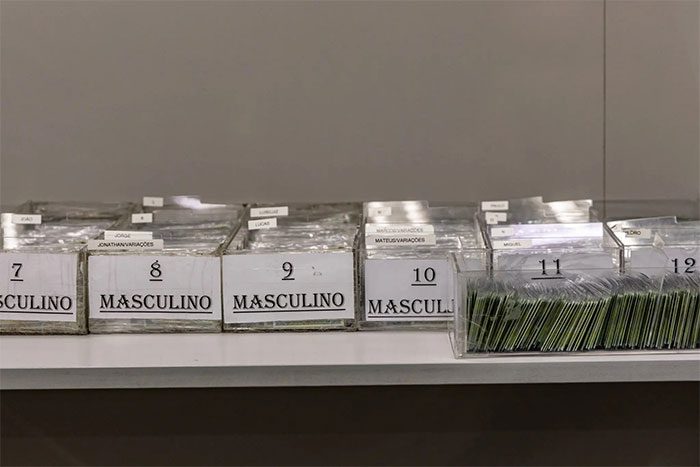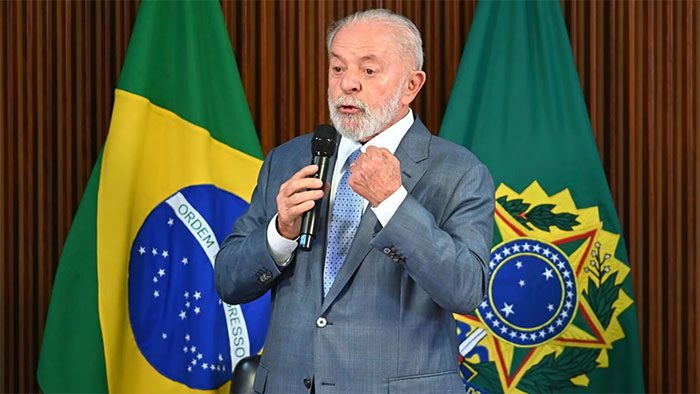Silva, a surname shared by approximately 5 million Brazilians, has long been viewed as a legacy of a dark chapter in the colonial era. However, many are now reinterpreting their surname Silva in new ways.
The Legacy of a Dark Era
The surname of Fernando Santos da Silva—and about 150 of his relatives—comes from a dark chapter in Brazil’s history.
Like millions of others in the most populous country in Latin America, Fernando Santos da Silva inherited this legacy from his ancestors, who were once enslaved, possibly named after their captors.

A citizen ID card is set to be delivered to a government facility in Rio de Janeiro in November. Approximately 5 million Brazilians share the surname Silva. (Photo: New York Times).
With such a painful origin, Silva has long been a source of shame, even as it became the most common surname in Brazil. But today, Silva is understood in a completely different light.
“Silva is a symbol of resistance,” says Santos da Silva, 32, an antique dealer from Rio de Janeiro. “It’s a connection to both the present and my ancestors.”
Whenever you meet a Brazilian, there’s a good chance that Silva is hidden somewhere in a long, melodious surname. If not, they definitely have a friend or relative with that name. (Most Brazilians use both their mother’s and father’s surnames).
Silva is found in the name of Brazil’s president, Luiz Inácio Lula da Silva, and the country’s most famous football player, Neymar da Silva Santos Júnior. It is also shared by about 5 million other Brazilians, from movie stars and Olympic medalists to teachers, drivers, and cleaners.
The exact way Silva spread throughout Brazil—one in every 40 Brazilians has this name—is a subject of some debate. However, historians agree that much of its popularity is linked to slave owners who named many of their slaves, who then passed it down to future generations.

President Luiz Inácio Lula da Silva is also a bearer of the surname Silva. (Photo: Reuters).
With roots in the colonial era, this name has for decades been synonymous with poverty and oppression in a predominantly Black nation, where slavery was only abolished in 1888 and deep-seated racial and economic inequalities persist.
In Brazilian popular culture, the arduous experiences of those bearing the surname Silva have long been depicted widely, such as through a famous funk song from the 1990s about a working-class man becoming a victim of violence devastating the poor suburbs, predominantly Black, of Rio de Janeiro. “It’s just another Silva, not shining,” goes the song.
When Society Changes Its Perception
In the past, few Brazilians took pride in the name Silva. Many notable figures, including Ayrton Senna da Silva, a legendary Formula 1 driver in the 1980s and 1990s, quietly dropped the Silva from their names.
But as Brazil reflects on how its brutal past has shaped the nation’s identity, an increasing number of influential figures are conveying the idea that there is nothing shameful about being a “Silva.”
The success of celebrities, such as mixed martial arts athlete Anderson Silva or football star Neymar, has also contributed to changing the old perceptions of the name Silva.
“Today, we are everywhere,” says Rene Silva, an activist from one of Rio de Janeiro’s largest favelas and host of a television show that highlights success stories in society, told the New York Times. “It shows that we are warriors – and we are winning.”

Brazil’s most famous football player, Neymar da Silva Santos Júnior, in the middle, with his mother, Gonçalves da Silva Santos, in Barcelona in 2022. (Photo: New York Times).
The prevalence of the name Silva can be clearly seen in any workplace, such as a busy notary office in Rio de Janeiro. Behind the reception desk, Tiago Mendes Silva, a 39-year-old office worker who inherited his name from both parents, is stamping and sealing documents.
“There’s always one or two Silvas here,” Mendes Silva, one of the seven employees in the notary office, said. Across the counter, Juscelina Silva Morais, a 59-year-old canteen staff member, is presenting a document she needs to legalize. “This name is part of our story,” she said. “It embodies Brazil.”
Mr. Santos da Silva, the antique dealer, was also there with his partner, Tamiê Cordeiro, to apply for a marriage license. “I’m not yet a Silva,” Cordeiro, 27, joked. “But I will be soon.”
In fact, although seen as a name belonging to those with ancestors linked to slavery, Silva also holds a special place among Brazil’s elite. At least four Brazilian politicians and lawmakers bear this name, according to data from The Public Agency, a non-profit investigative channel that recently mapped the ancestry of Brazil’s most powerful individuals.
“Because Silva is the name of the people”
Some historians trace the name Silva back to Roman times, where records mention a general by that name. Others link it to noble families in the Iberian Peninsula, now Spain and Portugal, during the reign of the Kingdom of León, established in the 900s.
Originating from the Latin “selva” or wilderness, the name Silva became popular in the 11th and 12th centuries among those living and working near the forests in that area.
“There are many origins one can speculate,” said Viviane Pompeu, a genealogist who runs a company helping Brazilians trace their ancestry. “But we find that the roots always come from somewhere in the woods, in the jungle.”
The name Silva entered Brazil with the process of colonization, with the first recorded instance dating back to a Portuguese settler in 1612. Notaries began tracking surnames about a century later, and since then, nearly 32 million Brazilians have been registered under the name Silva.
Scholars say that African slaves brought to Brazil by ship were sometimes baptized by priests and named Costa (“coast” in Portuguese) for those who arrived in coastal cities and named Silva for those who came to plantations in the dense jungles of the country.
Wealthy landowners named Silva often assigned the surname to those they enslaved, sometimes adding the preposition “da” (“of” or “belonging to” in Portuguese) to regard them as property.
“Carlos da Silva, for example – he belonged to someone in the Silva family,” explained Rogério da Palma, a professor at the State University of Mato Grosso do Sul and author of a book on racism in Brazil after the abolition of slavery.

President Luiz Inácio Lula da Silva views his surname as the name of the people. (Photo: AP)
Even after Brazil abolished slavery, the number of people bearing the surname Silva continued to rise. Freed slaves registering their documents sometimes took the names of their former owners and continued to work for them in exchange for housing and food.
“It was a way to belong,” Dr. Palma said. “It was also loyalty to that family that owned those slaves.”
More than a century later, echoes of this past are still present in the very lineage of Daniel Fermino da Silva. A history enthusiast, Fermino da Silva, 45, has spent over three years tracing his ancestry in archives and libraries. Ultimately, he uncovered a family history “tied to the history of Brazil.”
On his mother’s side, he descends from wealthy landowners in São Paulo who once owned many slaves. On his father’s side, records from the 1700s show that his Silva ancestors were captured approximately 800 kilometers away, in the mineral-rich state of Minas Gerais.
“I see my family and ancestors as heroes,” says Fermino da Silva, an engineer from Londrina in southern Brazil, referring to his maternal side.
It remains unclear how the current president of Brazil, the son of illiterate farmers from the country’s impoverished northeast, came to inherit the most common name in the nation.
During the colonial period, the area where President Luiz Inacio Lula da Silva was born witnessed a flow of Jewish refugees and other migrants fleeing religious persecution in Portugal. In search of a new identity—and anonymity—historians say many newcomers changed their names to Silva.
Some scholars believe this may be how Lula (President Luiz Inacio Lula da Silva is often referred to simply as Lula in Brazil) became a Silva. However, genealogists have struggled to definitively trace his origins.
“It’s a big mystery,” historian Fernando Morais, who wrote Lula’s official biography and has attempted to piece together the president’s family history, stated.
President Lula seems unconcerned. As a former union leader, he considers himself “just another Silva,” according to historian Morais. “Because that is the name of the people.”


















































